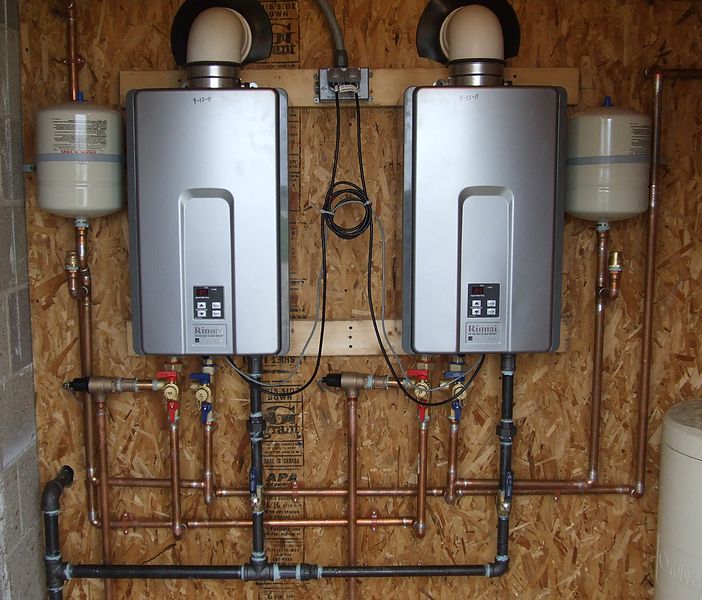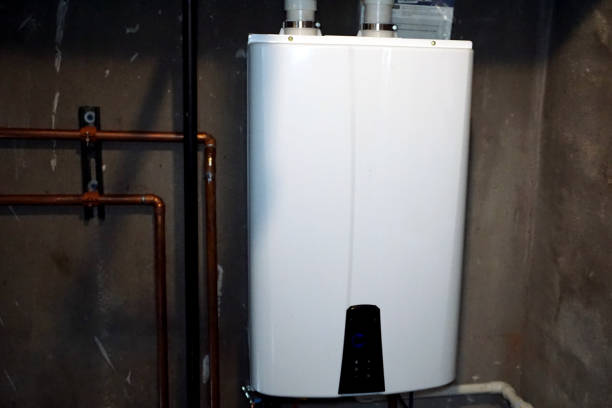Your Guide To Gaining The Benefits Of Tankless Water Heaters
Your Guide To Gaining The Benefits Of Tankless Water Heaters
Blog Article
Presented here on the next paragraphs you might get a bunch of high-quality news related to Six Benefits of a Tankless Hot Water Heater.

In a globe where comfort and performance reign supreme, it's not a surprise that homeowners are continuously looking for smarter methods to manage their home's energy consumption and comfort. One development that has progressively acquired popularity is the tankless water heater. Yet exactly what makes these systems stick out from the standard tank-based models a lot of us matured with? Allow's dive in and discover the benefits of tankless hot water heater, helping you make a decision if it's time to make the button in your home.
Introduction
Image this: you step into the shower after a lengthy day, anticipating a soothing cascade of hot water, only to be greeted by icy beads due to the fact that the last individual utilized all of it up. Noise familiar? Conventional water heaters save a fixed amount of warm water, indicating you're at the mercy of that storage tank's supply. Tankless systems, on the other hand, warmth water on demand. Say goodbye to going out mid-shower, say goodbye to wrestling with routines just to make sure warm water is offered.
Understanding Tankless Water Heaters
What Are Tankless Hot Water Heater?
Tankless water heaters, in some cases called on-demand or instantaneous water heaters, supply hot water only as it's required. Instead of keeping gallons of pre-heated water, these systems kick right into action the moment you switch on the faucet. Water travels through a heat exchanger, heating up in real-time, implying you get a nonstop flow of warm water without the demand for a big storage tank resting lazily by.
Just how Do They Vary from Conventional Equipments?
Typical heating systems hold a tank of hot water, using energy to keep that container at a regular temperature level. Tankless systems eliminate the standing supply, lowering squandered power and the bulky impact of a big cyndrical tube. Basically, you're upgrading from a "accumulation" way of thinking to a "made-to-order" strategy.
Typical Sorts Of Tankless Systems
Tankless water heaters typically come in two ranges: gas and electrical. Gas models have a tendency to provide greater circulation prices, ideal for larger homes, while electrical versions typically offer smaller sized homes and are typically simpler to install. In addition, some systems are designed for point-of-use (offering one fixture) while others can manage the whole home's warm water requirements.
Secret Benefits of Tankless Water Heaters
Energy Effectiveness and Price Cost Savings
Say goodbye to warming a titan tank's worth of water and maintaining it cozy all day. Tankless heaters minimize standby power losses, which can decrease utility bills. While the initial price may be higher, the long-lasting savings frequently validate the investment.
3. Space-Saving Layout
If your home is short on storage, eliminating the bulky storage tank frees up important room. Tankless devices are compact and can usually be installed on walls, concealed in edges, or mounted in tight energy closets without grabbing all of the whole area.
4. Longer Life-span
A properly maintained tankless water heater can outlive its tank-based cousin. Traditional storage tanks might last 10-15 years, while tankless models can keep downing along for two decades or more, making them a strong financial investment in time.
1. Unlimited Hot Water Supply
Ever before needed to set up showers so every person obtains their reasonable share of hot water? With tankless, that becomes a thing of the past. As long as the heating system's circulation capability isn't surpassed, you can take back-to-back showers without turning into a popsicle.
5. Improved Water High Quality
Keeping water in a container can sometimes bring about sediment buildup or a slightly "off" taste. With tankless systems, fresh water is heated up on the spot, decreasing the possibilities of debris buildup and potentially supplying cleaner-tasting water.
Considerations Before Changing
Though the benefits are engaging, it's wise to think about a few aspects prior to totally committing.
Assessing Your Home's Water Usage Patterns
If your house concurrently utilizes numerous fixtures with high hot water demand, make certain the device's flow rate satisfies your needs. Recognizing your use patterns assists you pick the appropriate size and type of tankless heating unit.
Maintenance and Treatment Tips
Tankless systems are relatively low upkeep, yet they aren't set-it-and-forget-it devices.
Regular Cleaning and Descaling
Hard water minerals can accumulate in the heat exchanger, influencing effectiveness. Normal descaling (frequently recommended yearly) maintains the unit performing at peak performance.
Yearly Specialist Assessments
A yearly checkup from a professional guarantees small problems are captured early. They'll evaluate the system's efficiency, seek leaks, and help keep optimum performance.
Preliminary Investment Costs
Tankless heating units commonly come with a higher upfront price. Between the unit itself and possible installment adjustments, the first cost may provide you sticker shock. However keep in mind to view it as a long-term financial investment.
Installation Requirements
Relying on your home's facilities, you may need added electrical ability or gas line upgrades. Ensure you recognize the setup needs and consult with a professional to prevent shocks.
Making Sure Correct Air Flow
For gas designs, correct air flow is important to securely eliminate exhaust gases. Ensure venting systems are tidy and properly installed to prevent any kind of potential safety threats.
Contrasting Different Brands and Models
Not all tankless water heaters are created equal.
Researching Dependable Manufacturers
Try to find trustworthy brand names with a background of generating top quality systems. A trusted producer typically gives better customer assistance and longer warranties.
Setup: Do It Yourself or Expert?
While some home owners delight in dealing with projects themselves, tankless installment could not be the best time to break out the tool kit.
Benefits and drawbacks of Do It Yourself Installment
A DIY set up might save cash, but it features risks. Inaccurate installment can bring about inefficiency or safety and security concerns. If you're handy and have experience, it could be practical-- but wage care.
Checking Out Evaluations and User Feedback
Customer evaluations and responses from next-door neighbors or good friends that have gone tankless can provide valuable understandings. Sometimes, real-life experiences can be extra informing than advertising and marketing pamphlets.
When to Call an Expert Plumbing Professional
For the majority of, calling a professional ensures everything's done correctly. A professional plumber understands local codes, sizing needs, and venting parameters, reducing the threat of accidents.
Making best use of Effectiveness
You have actually purchased a tankless device-- now maximize its efficiency.
Ideal Temperature Level Settings
The majority of people set their units in between 120-140 F. Readjusting the temperature can enhance convenience and cost savings. Experiment to locate a wonderful place that does not lose power.
Pairing with Low-Flow Fixtures
Want to stretch your device's capacities? Take into consideration mounting low-flow showerheads and faucets. They reduce water use, allowing your tankless system to supply a consistent stream of hot water without stressing.
Environmental Influence
Tankless water heaters align with greener living objectives.
Reduced Carbon Footprint
By utilizing less energy and just heating water as needed, tankless systems can lower your home's carbon footprint, lowering your environmental influence.
Saving Natural Resources
Much less energy consumption and less thrown away hot water equate right into fewer natural resources being utilized, an ecological win-win.
That Benefits Many from Tankless Heating units?
The elegance of tankless heating systems is that they can suit a variety of homes.
Big Households vs. Solitary Passengers
Big households might love the countless warm water supply, while single owners appreciate the energy cost savings from not warming a whole container for just one person's morning shower.
Property Owners with Limited Space
If your home is short on square video, losing the cumbersome tank frees up room for various other fundamentals-- or perhaps just a lot more breathing space.
Eco-Conscious Consumers
Going tankless aligns with eco-friendly values, ensuring you're not throwing away energy or resources.
Future Fads in Tankless Water Heaters
The world of home devices is ever-evolving, and tankless water heaters are no exception.
Innovations in Technology
R&D is continuously enhancing warmth exchangers, making devices extra efficient and durable. Future versions may be also quieter, more compact, and better matched for varying climates.
Smart Home Assimilation
Imagine readjusting your hot water heater's temperature level by means of an application or obtaining maintenance notifies on your phone. As smart home technology breakthroughs, we'll see more connectivity and ease.
Final thought
Selecting a tankless hot water heater is greater than just updating your home's warm water system; it's investing in lasting comfort, power efficiency, and a greener way of life. By considering your household's water usage, bearing in mind installation requirements, and committing to routine upkeep, you can delight in a constant stream of hot water without the luggage of a cumbersome tank. As innovation progresses, you can look forward to even smarter, much more efficient tankless services that not only make your life simpler but likewise profit the earth.
Pros and Cons of Tankless Water Heaters
Tankless Water Heater Pros
Saves Energy: Simply put, you re spending less energy to create hot water, so your total carbon footprint goes down, not to mention your bills. Lasts Longer Than Storage Tanks: Storage tank units need to be replaced every 15 years or so. But tankless units? They can last for 30 years before they give out on you. Constant Hot Water: Need to take a shower and don t want the water running cold? Awesome it won t. The water will stay hot the entire time because it creates hot water on demand. Saves You Money: Less water usage equals less money. Beyond that, you re not paying to keep water hot 24/7. Those savings add up quickly. Better for the Environment: Less water waste is better for everyone. It saves you money, but it s also environmentally conscious at the same time. Tankless Water Heater Cons
It Can Take a Minute: Depending on your specific unit and its placement, it can take anywhere from 10 seconds to 2 minutes to fully heat up. Because there s no storage tank, it heats water as you need it. Upfront Purchase Price: While we talked about their longevity, there s sticker shock when you look at brand-new tankless units to install. It pays for itself, but it s still a big chunk of change at first. Has its Limits: If you run multiple appliances at once, such as the dishwasher, washing machine, and maybe you take a shower at the same time, there might not be enough hot water. https://www.airsouthnow.com/blog/water-heater-service/pros-and-cons-of-tankless-water-heaters/

We had been guided to that editorial on Six Benefits of a Tankless Hot Water Heater from a good friend on a different domain. For those who enjoyed our post kindly consider to pass it around. Thank you so much for taking the time to read it.
Call Today Report this page